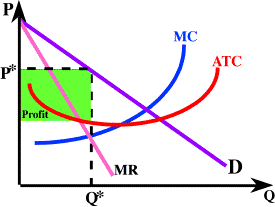
According to attorneys from the [Outside Econweb] US Department of Justice, which with the [Outside Econweb] Federal Trade Commission is responsible for enforcing antitrust laws, the [Outside Econweb] Microsoft corporation, makers of Windows 95® violated an accord reached with the Justice Department in a 1995 consent decree.
Manufacturers of computers using Intel microprocessors usually sell such machines with the Windows 95 operating system pre-installed. According to the Justice Department, Microsoft has been forcing manufactures to also install Microsoft's Internet Explorer® on these machines if they wish to install Windows 95, Microsoft does not deny this but argues that this is not in violation of the earlier consent decree. Internet Explorer is a web browser which competes directly with [Outside Econweb] Netscape Navigator® and [Outside Econweb] Mosaic as well as others.
According to the Justice Department, Microsoft is unfairly using its monopoly power in operating systems to gain an unfair advantage in the web-browser area as well. They are asking for a $1 million dollar a day fine against Microsoft until the company stops forcing manufacturers to install Internet Explorer.
Microsoft argues that a web-browser can be thought of as just another piece of the operating system and that it should be allowed decide what components are operating system and to insist that new users have such technological enhancements available automatically. Both Internet Explorer, Netscape Navigator and other browsers run on Windows 95 machines.
As economists it isn't our job to evaluate the legal or technical aspects of such matters, but the economic implications are fair game for our interpretation, though reasonable economists may well disagree on these interpretations.
First let's consider what Microsoft is doing and why.
Forcing computer manufactures to ship machines with Internet Explorer installed doesn't prevent users from downloading and installing Netscape Navigator, but it may well dissuade them from doing so. According to the Justice Department such action is designed to .."undermine consumer choice." If the Justice Department is correct, Netscape will certainly be hurt by Microsoft's Strategy.
Is this a profitable short-run strategy for Microsoft or is it likely to be a more long-run strategy? The answer to that question lies in part in costs and in part in consumer perceptions. Are consumers more likely to purchase computers with Internet Explorer installed, do manufacturers benefit, does Microsoft benefit?

Consider the standard monopolist graph to the right. Suppose this is the demand for new computers with Windows 95 without Internet Explorer pre-installed. As we can see the profit maximizing price and quantity are clearly P* and Q* respectively. Any other price/quantity pair will reduce profits. Do consumers want Internet Explorer pre-installed? The answer is a clear, "it all depends."
First time computer buyers may prefer having a browser installed so that the don't have to install or choose a browser. Indeed, many first time users may not know how to go about downloading or installing a browser. If so, would such consumers be hurt if Explorer isn't installed? Presumably the Justice Department would be satisfied if vendors of new computers with Windows 95 installed were allowed to install the browser of their choice, or if the consumer could choose a browser to be pre-installed when ordering the computer or if several come installed with de-installation instructions.
Experienced users may well prefer Netscape Navigator (it certainly is the most popular browser at this time) and may find a pre-installed browser an annoyance, especially if de-installation is difficult. This is even more likely to be true if they have been users of Navigator or some other browser for some time and don't wish to change software. On the other hand, having Internet Explorer pre-installed makes it very easy to download Netscape Navigator. Frankly, experienced users probably don't care one way or the other as they can quickly reconfigure to suit their preferences.

Currently, knowledgeable users can download the browser of their choice at no cost other than the effort of beginning the download and a little installation effort. Still, some users may find that effort annoying. What does the market for browsers look like? Perhaps the graph to the left is a fair representation of a simplistic view of the market for freely downloadable browsers. Since most browsers are relatively free we can assume that the demand curve if probably fairly elastic. Without doubt, the supply curve is perfectly elastic. DL is the cost of a browser which must be downloaded from the internet. PI is the cost of a pre-installed browser. The main cost of a browser is the download and installation effort with some time cost involved in configuration which is necessary even if the browser comes pre-installed. Certainly consumers don't believe that all browsers are equal, but for any given browser the consumer would prefer pre-installation to downloading, so in general pre-installation is a plus. Inexperienced users will almost certainly use whatever browser comes pre-installed, and even experienced users will have to bear a time cost of switching browsers.

It seems reasonable then to assume that consumers would like to have a browser pre-installed on a new computer, but that most would prefer to choose the browser. Ideally either the consumer would specify the browser at the time of purchase or several would be installed. Consider the graph to the right. The original demand curve for browser free Windows 95 machines is now shown in light gray. The Blue Demand and MR curves are for Windows 95 machines with Internet Explorer installed and the Magenta Demand and MR curves are for machines with the consumer's choice of browsers, or a variety of browsers installed.
Since consumers would naturally prefer pre-installation but would most enjoy (we imagine) having a choice of browsers this would be a short-run profit maximizing strategy (assuming other browser publishers don't mind having their software pre-installed). A vital point however is that In either case, the original price is no longer profit maximizing! Nevertheless, from the information we have Microsoft isn't raising it's price when it forces this sort of bundling so the strategy cannot be short-run profit maximization. Thus, it must be a long run strategy.
The fact that this is a long-run strategy isn't proof that the Justice Department is correct in it's assessment of the reasons Microsoft is forcing the bundling of Internet Explorer, but the evidence does indicate that something other than short-run profit is at stake.
For now, the demand for browsers is both very elastic and consumers aren't yet strongly brand loyal to their browsers. Mosaic was the first well-known browser and was quickly supplanted by Netscape Navigator as the predominant browser. In a relatively short period of time Internet Explorer has become the browser of choice for about 1/3 of computer users, presumably taking most of that away from Navigator.
There are some who argue that the internet, web browsers, Java and other similar technologies will make Operating System choices such as Windows 95, Mac OS, Linux or UNIX irrelevant. Naturally, a world in which operating system choice is irrelevant is a world Microsoft, as the dominant producer of operating systems, fears. The important battle being fought today is for the desktops and hearts of the typical users. As demand for internet tools becomes more inelastic in the future, as they certainly will, and if brand loyalty becomes important, as it has for software and operating systems, then the important battle is to get your browser to be the default browser on as many on as many systems as possible as quickly as possible.
In
such a world, Microsoft's strategy is clear. Use the fact that
they supply OS software for roughly 90% of new computers sold
to be sure that Internet Explorer is the default browser on the
systems and in the minds of most users. Only the courts can tell
us if what they are doing is unfair use of monopoly power and
a violation of the earlier decree, but making Internet Explorer the dominant browser, and keeping Microsoft the dominant operating system are clearly the goal.
Copyright © 1995-2003 OnLineTexts.com, Inc. - All Rights Reserved